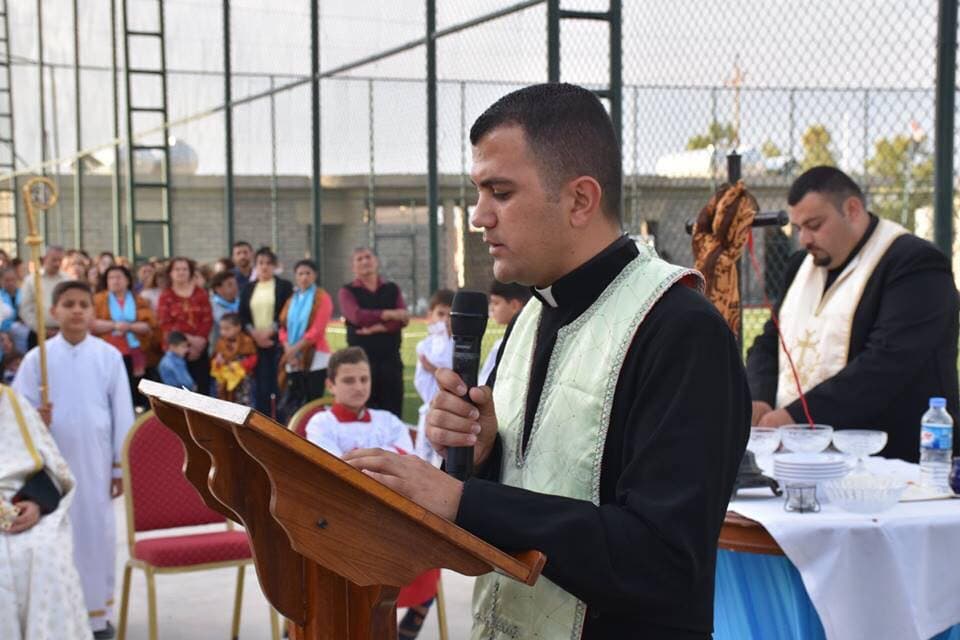ROME – A priest from Qaraqosh helping to prepare the city’s youth for Pope Francis’s visit next month has said the fact that a pope is traveling to the country for the first time has shown young people that the Church, which can often seem far away, is close to them.
“Here in Qaraqosh, we are so happy that the pope will come to visit us,” said Iraqi Father Roni Momika in comments to Crux.
Calling Pope Francis’s upcoming trip to Iraq “a historic visit,” Momika noted that most Christians in the country have suffered some form of violence or persecution for their faith, with hundreds of thousands forced to leave everything behind and live as refugees during the 2014-2017 ISIS insurgency of the Nineveh Plain.
“This visit will give us the strength to stay here in Qaraqosh and to continue our life,” he said, voicing hope that the pope’s visit will have a political impact. Once Pope Francis comes, Momika said, “the government will take care of us.”
Christians in Iraq have long been discriminated against and have often complained of being treated like second-class citizens, making the pope’s visit all the more important to the country’s tiny Christian minority.
Young people in particular are “very excited” that Pope Francis will come, Momika said. Speaking of those in his home city of Qaraqosh – once dubbed the “Christian capital” of Iraq and where the headquarters of the Syriac Catholic Church is located – Momika said youth in the village used to think “that no pope would ever come to Iraq.”
“Now when they heard that Pope Francis would come to visit Iraq, they felt that the head of the Catholic Church is near,” he said, adding, “Iraqi Christians are in pain, they have lost everything, but the Church is with them.”

A Syriac Catholic priest from Qaraqosh, Momika was ordained a deacon and then a priest in a refugee camp in Erbil in 2016, after ISIS had taken over swaths of Iraq’s northern Nineveh Plain. Once villages on the Plain were liberated, Momika moved back to his hometown of Qaraqosh and led women’s groups before moving to Lebanon, where he is currently completing his studies.
Momika was given permission to return to Qaraqosh to assist in preparations for the pope’s March 5-8 visit to Iraq, which includes a stop in Qaraqosh.
The trip will also include stops in Baghdad, Erbil, Qaraqosh, Mosul, the Plain of Ur, and Najaf, where Francis is scheduled to meet privately with one of the top authorities in Shi’a Islam, Grand Ayatollah Al-Sistani.
He will visit Qaraqosh on March 7, a packed day for the pope which also includes stops in Mosul and Erbil.
In Qaraqosh, Francis will host a meeting with the local community inside the church of the Immaculate Conception, which was burned and vandalized by ISIS, with some graffiti still visible on the charred stone walls. After praying the Angelus, the pope will then leave and head back to Erbil for Mass.
Ahead of the pope’s visit to Qaraqosh, Momika has been tasked specifically with preparing young people in the area, as most have limited knowledge of the pope and the Vatican – things that often seem distant and out of touch with their daily reality.
To get young people ready, Momika helped organize a large event last week attended by some 7-800 youths from Qaraqosh and surrounding villages such as Bartala, Karamles, Bahzani, and Bashiqa.
In addition to discussing scripture and evangelization, speakers at the event also gave talks on Pope Francis himself, and the special attention he pays to young people and to the poor and marginalized, including migrants and refugees.
“There were a lot of young people who didn’t know a lot about the pope or the Church, but now after this youth day they started to research and they want to know everything about Pope Francis, especially when they heard that Pope Francis is a friend of the poor, a friend of families and a friend of youth,” Momika said.
After the event, “I think Pope Francis became closer for young people,” he said.
Things started off with a major procession through the streets of the city, hoisting a large cross at the front of the crowd as they processed through Qaraqosh. Once they arrived at the hall where the event was being held, they opened with a prayer in Syriac and Aramaic.

Throughout the day talks were given by priests, nuns, monks, and even the Syriac Catholic Archbishop of Mosul, Yohanna Petros Mouche, with the focus being on what Pope Francis has said and written about young people, the poor, and families. Momika himself spoke about young people, and the pope’s invitation to brotherhood and solidarity, as well as his frequent encouragement for youth to go to take the Gospel to the streets.
Youths also practiced a song and dance that they will perform for Pope Francis when he arrives to Qaraqosh, and they painted a large banner of Pope Francis that will be hung up during the visit. They also went around the city hanging up posters and banners of welcome for Pope Francis, with words of welcome written in both Syriac and Italian.

Momika voiced his conviction that the faith of Iraqi Christians will be strengthened as a result of the papal visit.
“I think it will be good, because Iraqi people and especially people in the Middle East have a strong faith,” he said, adding that for him personally, the pope’s decision to come “will push us to be even stronger in faith and to stay here and to say that we are Christians, and that we are proud we are Christians.”
Follow Elise Ann Allen on Twitter: @eliseannallen












